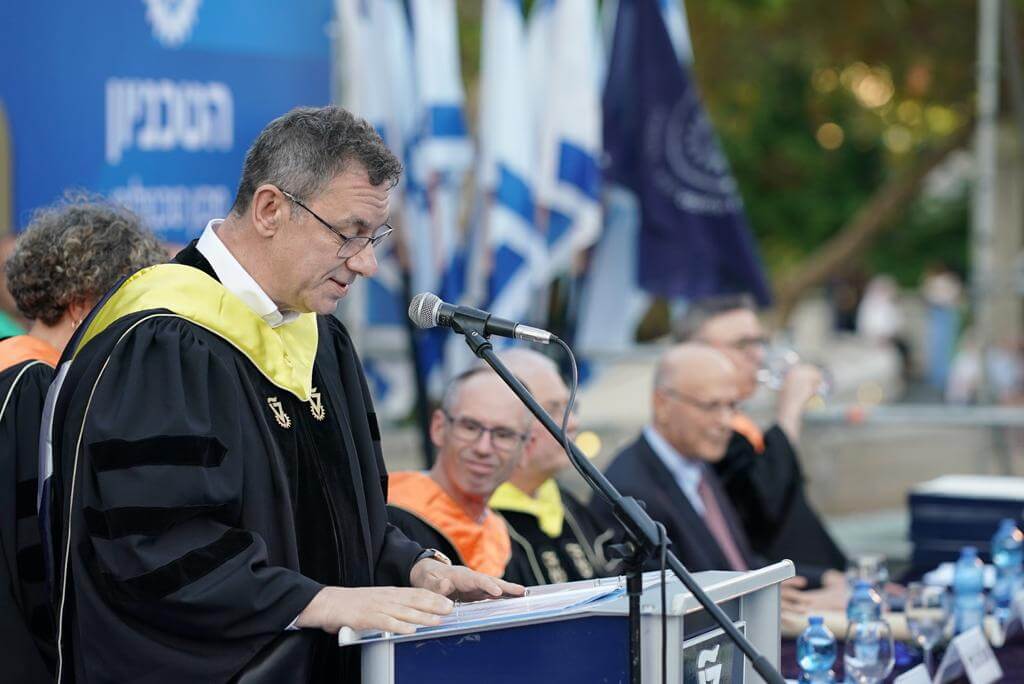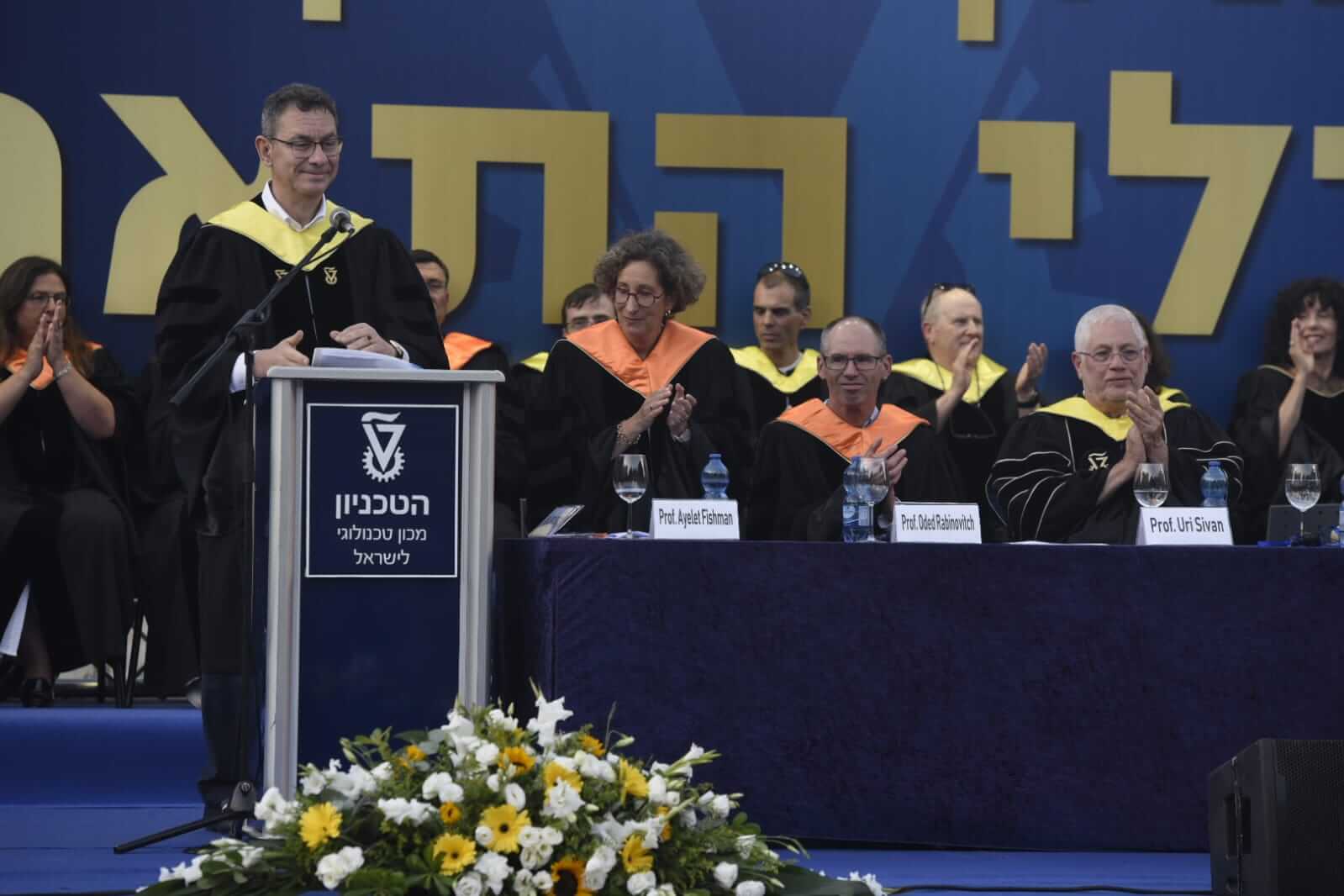The reason for the award - "an extraordinary biotechnological achievement that testifies to the importance of science" * At the same time, Borla won the Genesis Prize worth one million dollars, which is an advantage for the establishment of a museum for the heritage of the Jews of Thessaloniki in the city * Includes a transcript of Borla's speech at the ceremony

Technion President Prof. Uri Sion yesterday awarded an honorary doctorate to Pfizer Chairman and CEO Dr. Albert Borla. The event took place during the Technion graduation ceremony for the 1,869 graduates of the XNUMXrd cohort. Dr. Borla received the degree from the Technion "in recognition of his exemplary leadership in the rapid development of a safe and effective vaccine for Corona; Muttering thanks for leading a major move in the face of a global crisis; and in admiration for uncompromising commitment and a pioneering and original initiative that expresses the highest values and standards of excellence in scientific innovation."
An honorary doctorate is the highest recognition given by the Technion to individuals who have distinguished themselves in their extraordinary scientific practice or in their contribution to Israel, the Jewish people and humanity. Past recipients of the degree include Chaim Weizmann (1952), Albert Einstein (1953), Niels Bohr (1958), David Ben Gurion (1962), Eugene Wigner (1971), Margaret Thatcher (1989), Yitzhak Rabin (1990) ) and Dr. Angela Merkel (2021).
Technion President Prof. Uri Sion He said at the ceremony that "as chairman of the board of directors of Pfizer, Dr. Borla led the complex effort to develop a vaccine for the corona virus in record time. The development of the corona vaccine is an extraordinary biotechnological achievement that testifies to the importance of science and interdisciplinary research. The vaccine helped rescue the world from the crisis we found ourselves in following the outbreak of the plague at the end of 2019. The family story of Dr. Borla, son of Holocaust survivors from Thessaloniki, is a symbol of the wonderful life of the Jewish people and their ability to regenerate after the Holocaust."
Dr. Albert Borla He said at the ceremony "It is a huge honor for me to receive an honorary degree from the Technion and to congratulate the new graduates of the Technion. Since opening its doors in 1924, the Technion has been a model not only for Israel but also for all of humanity. The story of the Technion, similar to the story of Pfizer, my company, is a story of innovation but also of courage and optimism - three elements that helped in the realization of technological breakthroughs designed to make the world a better place.
"Innovation, courage and optimism characterize my colleagues at Pfizer. It took courage to decide to use mRNA technology in the corona vaccine that we developed with BioNTech. This courage helped us develop a safe and effective vaccine in just nine months. Furthermore, the courage is essential for the application of this technology in other fields of medicine, including the treatment of cancer and rare diseases. Our successful journey to vaccination has proven that we can do the impossible, and our colleagues derive from this inexhaustible optimism in their work in other fields."
Dr. Albert Borla was born in Thessaloniki in 1961 to a Jewish family, part of which perished in the Holocaust. His family, who came to Greece following the expulsion from Spain, dealt in jewelry and diamonds and their business spread over many countries. The community of Thessaloniki, which was the largest Jewish community in Greece, numbered about 80 thousand people in the XNUMXs; About two thirds of them perished in the Holocaust.
Dr. Borla told the Technion graduates at the ceremony that they must adopt ingenuity, compassion and courage as guiding values. "In your journey in the future you will be required to choose between many different alternatives, and you must always remember to aim high, not to break in the face of challenges and not to lose optimism. If you behave this way, you will be surprised by what you will be able to achieve - and your impact on the world."
Dr. Borela completed all his academic degrees at Aristotle University of Thessaloniki and is a doctor in veterinary medicine and reproductive biotechnology. In 1993, he joined the giant Pfizer, one of the world's leading biopharmaceutical companies, and since then has held a series of positions in it. He led the development of antibodies in the company and was the president of VOC - the global division that leads vaccines, oncology and patient health at Pfizer. In October 2018 he was appointed Chief Operating Officer of Pfizer, in 2019 he was appointed CEO of the company and since 2020 he is also Pfizer's chairman.
In recent years, Dr. Borla has led Pfizer in strengthening ties with technology companies and in the adoption of innovative technologies such as artificial intelligence. At the beginning of 2020, following the global outbreak of the Corona epidemic, he harnessed most of the company's resources to develop the vaccine for the virus, while meeting challenging schedules. All along, Dr. Borla promised that he would not compromise on the safety of the vaccine, and the approval was received after an extensive study that included more than 40 subjects. According to Dr. Borla, "In the fight against Corona, we could not find a better partner than Israel - a small country with an excellent medical system and digitization of the medical files, a country that can conduct the vaccination campaign successfully and document it well."
Dr. Albert Borla's speech at the ceremony of receiving an honorary doctorate at the Technion, 30/6/2022
I thank you, President Prof. Sion, and the entire Technion board for awarding me this honorary degree. I am honored to be part of the Technion community.
To all the graduates today - my best wishes!
As a scientist and a Jew, it is a huge honor for me to receive an honorary degree from you and to congratulate the new graduates of the Technion. Since opening its doors in 1924, the Technion has been a model not only for Israel but also for all of humanity. The story of the Technion, similar to the story of Pfizer, my company, is a story of innovation but also of courage and optimism - three elements that helped in the realization of technological breakthroughs designed to make the world a better place.
Dr. Albert Borla at the ceremony
Researchers at the Technion have led innovations in alternative fuels that help reduce climate change. Thanks to the research of Nobel laureates Research Prof. Aharon Chachanover and Research Prof. Avraham Hershko on the subject of ubiquitin-mediated protein degradation, we have a better understanding of human health. The Technion's first-of-its-kind collaboration with Cornell University leads to breakthroughs in connective media, medical technologies and urban engineering.
However, none of these successes would have been possible without courage and optimism - the courage of Paul Natan, who worked to establish a university in Israel that would improve the lives of Jews at a time when they were forbidden to study scientific and technological subjects in Europe, and the optimism of Dr. Haim Weizmann and Albert Einstein who refused to allow the vision of establishing the Technion fade away due to financial difficulties that befell him following the First World War.
Innovation, courage and optimism characterize my colleagues at Pfizer. It took courage to decide to use mRNA technology in the corona vaccine that we developed with BioNTech. This courage helped us develop a safe and effective vaccine in just nine months. Furthermore, the courage is essential for the application of this technology in other fields of medicine, including the treatment of cancer and rare diseases. Our successful journey to vaccination has proven that we can do the impossible, and our colleagues derive from this inexhaustible optimism in their work in other fields."
If you feel the way I did on the day I graduated from university, you must be thinking about all the hard work that was required of you to get this far, but you know - that was the easy part. You had a study plan and you did your part to finish it. What makes the next chapter challenging - but also more exciting - is that there is no set curriculum. The next chapter is all electives, and your choices will define your future.
I can't tell you what the right choices are for you because we are different people, coming from different backgrounds and circumstances. What I can do is share with you some simple truths I've learned along the way that may help you make the right choice for you and may help you change the world (or at least your little piece of God).
beginning, Setting extremely ambitious goals, which seem seemingly impossible, does not curb human ingenuity but rather gives it free rein. That's why you should always aim high. If you're going for incremental change, you might be improving on something someone else has done, which is great. But only when you aim for significant changes - with the goal of achieving what seems impossible - only then can you utilize the full potential inherent in your creativity, discover completely new ways to solve a problem and create real breakthroughs.
An ambitious goal does not of course guarantee success. In fact, it's likely that the first time you tackle an ambitious goal, failure will outweigh success.
Dr. Albert Borla speaks at the graduate ceremony
Second, and following the previous section, Resilience is just as important as initial success. Our failures can teach us even more than our successes. So, when something you decided to do doesn't happen as planned, don't give up; Try to understand why it didn't work and use that knowledge in the next attempt. This is how the world progresses.
Third, Optimism is contagious. I learned this from my parents - especially from my mother - and it was one of the key elements that inspired my colleagues at Pfizer to aim high and make the impossible possible.
Of course, in view of the fact that our world is facing various threats - war, plague and racial hatred and more - you may ask yourself: "How can I feel optimism in a world that seems so gloomy?"
There are many reasons to be optimistic including…
human ingenuity. Humans have proven their ability to solve problems, and innovations in digital technologies and biology have prepared us for significant progress in the fight against disease.
human compassion. As I was reminded during my visits to Yad Vashem this week, the compassion of those who helped Jews escape during the Holocaust inspires awe, and it can be seen today in those who welcome refugees from Ukraine, Afghanistan and other parts of the world.
Courage. There's that word again. The courage to try something new, to challenge the status quo, to go against injustice, is a powerful trait, and even the smallest acts of courage can make a difference in our world.
I will end my words with a quote from a man whom many have called the greatest philosopher of all time - and after whom the university I studied is named: Aristotle. "Excellence is never an accident. It is a choice among many options. It is choice, not random fate, that determines your destiny."
When you are faced with the variety of options before you in your journey, always remember to aim high, show resilience and maintain optimism in all your actions. If you do this, you will be surprised at what you can achieve - and the power of your influence.
I thank you again for inviting me to be a part of this celebratory event and wish you all much success.
Congratulations and good luck.

